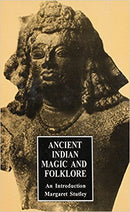From the Jacket:
Margaret Stutley is the author, with her husband, of A Dictionary of Hinduism, an indispensable reference work based on many years of research. In the present volume she draws on her study of religious cults and folklore to provide an introduction to the ancient magic and folklore of India. But the main source is the Atharvaveda, compiled about 1400 BC and containing much earlier lore, some of it originating in Sumeria, Babylonia, Iran and ancient Egypt.
The book demonstrates that there are many parallels between Indian and European folklore, since both Europeans and the north western Indian peoples are of Caucasian origin. The wearing of lucky charms, talismans and amulets is common to both , as well as the belief in lucky and unlucky days, birds and animals, the fear of curses and of the evil eye - still common in Africa, the Mediterranean countries and the East.Another common element is the fear of demonic possession, which has increased so much in the West that in 1972 the Bishop of Exeter set up a commission to devise the ritual for the exorcizing of evil spirits from people and haunted places.
Margaret Stutley points out that magical elements exist in every religion since it is their presence that makes a system of beliefs into a religion. Thus magic and cult are essentially the same, all rites being basically magical. She also shows that in all societies different stages of belief exist side by side, and range from naïve magico-religious beliefs to the most advanced spiritual and philosophical views.
About the Author:
Margaret Stutley is a private scholar who, with her husband James, retired over twenty years ago to North Wales. A Fellow of the Royal Asiatic Society, she became interested in Buddhism and Hinduism in her teens and has since, with her husband, formed a library of Indological works, including most of the important works of modern scholarship upon which Ancient Indian Magic and Folklore and A Dictionary of Hinduism are based.
Description
From the Jacket:
Margaret Stutley is the author, with her husband, of A Dictionary of Hinduism, an indispensable reference work based on many years of research. In the present volume she draws on her study of religious cults and folklore to provide an introduction to the ancient magic and folklore of India. But the main source is the Atharvaveda, compiled about 1400 BC and containing much earlier lore, some of it originating in Sumeria, Babylonia, Iran and ancient Egypt.
The book demonstrates that there are many parallels between Indian and European folklore, since both Europeans and the north western Indian peoples are of Caucasian origin. The wearing of lucky charms, talismans and amulets is common to both , as well as the belief in lucky and unlucky days, birds and animals, the fear of curses and of the evil eye - still common in Africa, the Mediterranean countries and the East.Another common element is the fear of demonic possession, which has increased so much in the West that in 1972 the Bishop of Exeter set up a commission to devise the ritual for the exorcizing of evil spirits from people and haunted places.
Margaret Stutley points out that magical elements exist in every religion since it is their presence that makes a system of beliefs into a religion. Thus magic and cult are essentially the same, all rites being basically magical. She also shows that in all societies different stages of belief exist side by side, and range from naïve magico-religious beliefs to the most advanced spiritual and philosophical views.
About the Author:
Margaret Stutley is a private scholar who, with her husband James, retired over twenty years ago to North Wales. A Fellow of the Royal Asiatic Society, she became interested in Buddhism and Hinduism in her teens and has since, with her husband, formed a library of Indological works, including most of the important works of modern scholarship upon which Ancient Indian Magic and Folklore and A Dictionary of Hinduism are based.
Payment & Security
Your payment information is processed securely. We do not store credit card details nor have access to your credit card information.


